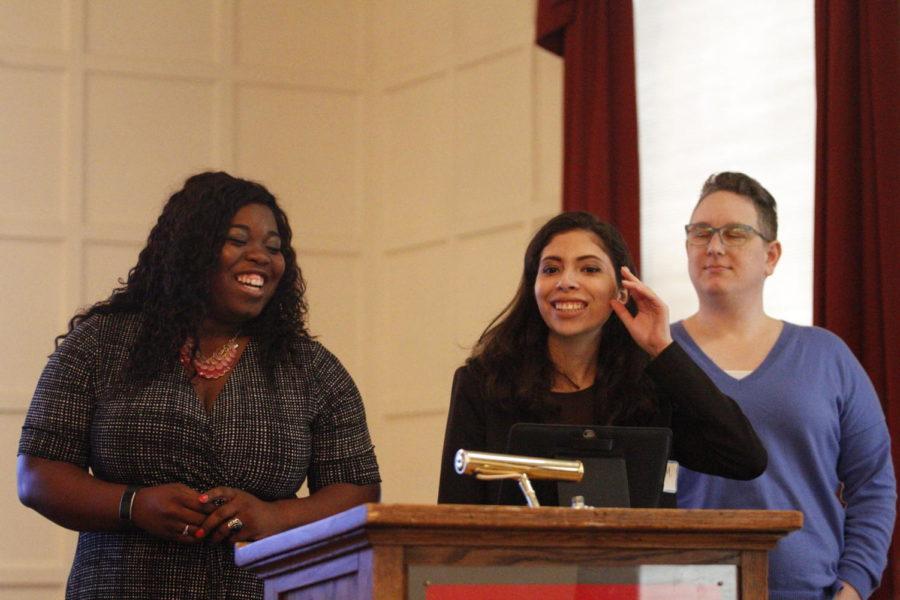Students digest gender and society at student conference
Alexandra Kelly/Iowa State Daily
Alexia Angton, Adriana M. Martinez, and Arielle True-Funk presenting their piece titled “Seeing Gender in The Daily: An Analysis of Gender in Iowa State’s Campus Newspaper.” Transforming Gender and Society Conference was held Saturday from 9-5 in the MU. The conference had a variety of speakers.
April 1, 2017
Rekha Basu, opinion columnist for the Des Moines Register, went into work early yesterday to write her Sunday column but quickly found herself distracted by the litany of emails telling her she was not in good standing with God.
Basu said the letters were reactions to a column she had written in Thursday’s paper that had taken issue with Iowa State legislator Rep. Shannon Lundgren’s claim that “life begins at conception,” stating that legislators have used that as a basis for the argument that all abortions should be illegal.
“I called that claim a myth,” Basu said, “Which Essentially relegates it to the realm of mythology which describes the stories each religion tells its members in support of its doctrine.”
Basu, who has appeared on NBC Night News, CNN and C-SPAN Book TV, to name a few, served as the keynote speaker Saturday afternoon at the second annual Women, Gender and Sexuality Studies Student Conference. The conference, titled Transforming Gender and Society, took place in the Memorial Union. It was organized by Iowa State’s Women’s and Gender Studies Program.
The conference was composed of three 90 minute sessions. Each session was composed of scores of student-led presentations tackling the topics of women and gender in society. Student projects focused on a plethora of themes, including identity, wellness, gender in politics and gender as it related to digital literacy.
Conference organizers invited both undergraduate and graduate students to present at the conference, contrasting last year’s event in which only undergraduates were able to present.
Students were encouraged to present academic research and creative works. Presentations were also done in the forms of panels and roundtable discussions.
In a session titled “Transforming the Digital Age,” Jasmina Bonilla, a senior in communication studies at Graceland University, presented on a divide in digital literacy in reference to gender.
Bonilla cited several studies that illustrate the onset of gender stereotypes pertaining to women and technology. She said that women are generally perceived as technologically illiterate.
Bonilla also cited a study that observed interactions between female YouTubers and their viewers. The study found that women, more often than men, were subjected to hostile comments. Any encouraging comments were about the YouTuber’s appearance, not the content itself.
“If women can’t access technology safely, it discourages them from doing,” Bonilla said.
Erin Gilligan, a senior in performing arts at Iowa State, brought tears to the eyes of her audience members after reciting “She,” a creative literary piece.
The fiery piece challenged stereotypes and touched on the realities of being a sexual assault survivor. Gilligan said that the piece was originally written for a creative writing class when Christiana Langenberg, professor of the course, prompted the class to write a biography.
“Anytime that I write, [my experiences] are going to come through,” Gilligan said. “The word ‘she’ is so powerful. It comes with a lot of negative connotations.”
Basu spoke during the lunch portion of the conference. In her column on abortion legislation, she shared examples of a piece written by the president of the American Society for Reproductive Medicine in Washington, D.C.
“He puts the idea that ’life begins with conception’ [is] in the same league as fake news and disinformation for deliberately confusing the public about what is science and what is religious belief, ” Basu said.
Last June, Basu accompanied a bearded individual into a series of women’s bathrooms in and around Des Moines to make a point about civil rights.
“We got stared at, laughed at, yelled at, thrown out and threatened with arrest,” Basu said.
The person Basu had accompanied was a transgender male. At the time, a state law in North Carolina required transgender people to use public bathrooms not of their gender identification, but the gender assigned at birth. The individual wanted to show how absurd that could be for someone is his position.
“He felt capturing discomfort of bystanders and managers was the most powerful way to illustrate the wrong-headedness of the law, not just for North Carolina, but of politicians around the country who have been seizing on the bathroom issue to energize religious conservative basis,” Basu said.
The law was repealed on Thursday.
“Everybody has the right to be who they are and make intimate personal decisions about their bodies without the fear of arrest, loss of job, or the denial of bathroom access,” Basu said.
Throughout her speech, Basu paid homage to a number of individuals that she had written about in her columns who have exhibited resistance to social and legislative constructs that they found to be unjust. Several of those stories were taken directly from her book, “Finding Her Voice,” a compilation of columns about women.
“As one who makes my living from the news, I sometimes feel so outraged that it’s emotionally overwhelming, but checking out is not an option for me, and it shouldn’t be an option for any of us,” Basu said. “The best antidote to despair is action.”
Basu also expressed disdain for recent legislation proposed on the topics of minimum wage and self defense, namely the “stand your ground” legislation that says a law-abiding person does not have a duty to retreat from “any place where the person is lawfully present” before defending themselves with deadly force, according to the Des Moines Register.
Basu closed by urging attendees to use their stories, and stories of their peers, to share broader truths to combat hateful political propaganda. She left the audience to think on an African proverb:
“Only when lions write their own history, will the tale of the hunt cease to glorify the hunter.”







